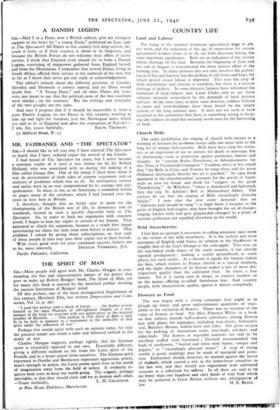THE SPIRIT OF MAN
Sut,—Most people will agree with Mr. Charles Morgan in com- mending the fine and representative nature of the poetry that goes to make up Robert Bridges' book, The Spirit of Man, yet for many this book is marred by the wretched preface showing
the narrow limitations of Bridges' mind.
Of this preface, one of the most distinguished Englishmen of this century, Havelock Ellis, has written (Impressions and Com- ments, Vol. iii, p. 29): " I read this preface with a shock of horror .... the Author reveals himself as the most Pharisaic of self-righteous jingoes, as a war- monger of the kind we associate with our gutter-press, as the inspired prophet of Hysteria. . . . This preface to The Spirit of Man is only fit to be held in memory as a monument to the imbecility of that spirit under the influences of war."
Perhaps few would agree with such an opinion today, for only the greatest minds can retain a calm and balanced outlook in the midst of war.
Charles Morgan suggests, perhaps rightly, that the German spirit is essentially opposed to our own. Essentially different, giving a different outlook on life from the Latin spirit of the French, and to a lesser extent from ourselves. The German spirit expressed in Goethe and Beethoven represents aggression, power, man's strength in action, the Latin poetic spirit lives in the world of imagination away from the field of action. It evidently re- quires both sorts to keep the work/ going. The tragedy, perhaps inevitable, is that they should clash and try to destroy each other. —Yours faithfully, L. H. CALLENDAR.
30 Pine Road, Didsbury, Manchester.






























 Previous page
Previous page